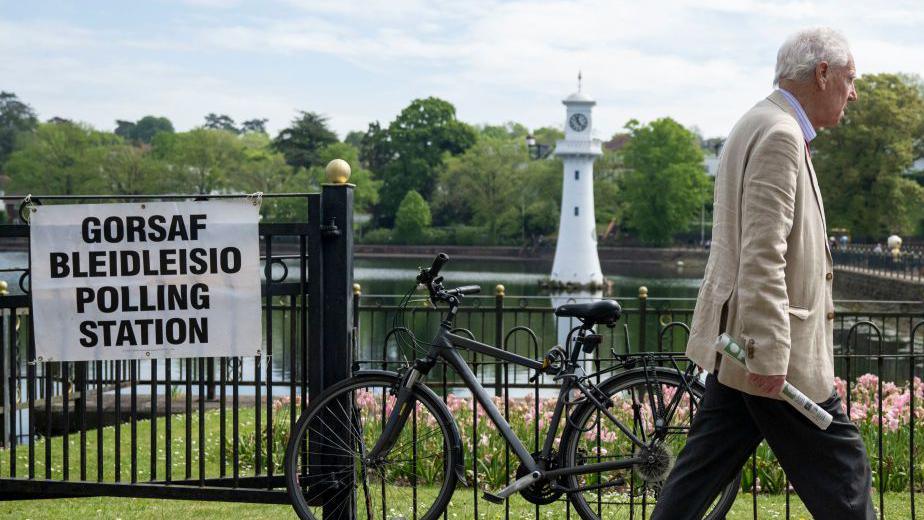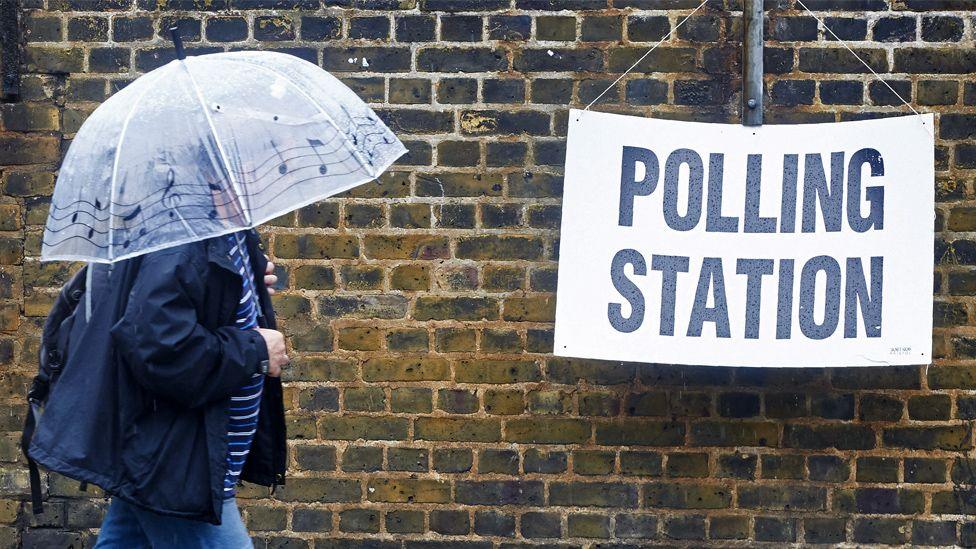Polling day is dehumanising, says blind voter

Elin Williams, who is only able to see light, dark and shapes without detail, says she has never been able to vote without help from someone else
- Published
Voting in a general election is "dehumanising" due to a lack of accessibility, says a visually impaired voter.
Elin Williams, 27, was diagnosed with degenerative eye condition retinitis pigmentosa when she was just six.
As a result, she has not once been able to independently cast her vote at any election or referendum.
The Electoral Commission, which sets the rules for how elections are run, said "everyone should have the right to vote independently and in secret".
Who should I vote for and what are the parties promising?
- Published3 July 2024
I went without Sky TV as a child, says Sunak
- Published12 June 2024
Can I take children or pets to a polling station?
- Published29 April
Ms Williams, from Colwyn Bay in Conwy county, said that on her first - and last - visit to a polling station there was "no understanding of accessibility" and she had to bring someone with her to mark the box.
She now votes by post, but still needs someone else to fill out her postal vote.
"It makes me feel like disabled people's vote isn't important, like my right to vote independently and secretly isn't respected," she said.
"It can be a bit dehumanising to be honest."
In addition to just voting, Ms Williams said there are barriers to most aspects of the general election, including even deciding who to vote for.
"[Party manifestos] often aren't produced in accessible formats, so we aren't even provided with the information we need to be able to confidently place our vote.
"It definitely goes beyond the election as well, accessibility is a huge barrier day to day for disabled people in so many different ways.
"It's difficult to even narrow down."
Research from sight loss charity RNIB Cymru has shown that fewer than one in five (19%) blind voters are able to cast their vote independently and in secret.
“Imagine turning up to your local polling station, only to find out that are unable to cast your vote because essential tools and support you need aren’t available," said the charity's director, Ansley Workman.
She said the suggestion that disabled people shouldn't have their rights upheld because the solution may be complex is "quite frankly insulting".
"It is the responsibility of electoral administrators to enable everyone to cast their vote. Accessibility must always be the top priority.”

Every polling station should be able to offer voters a tactile voting device, polling booth at wheelchair level, magnifiers and pencil grip, says the Electoral Commission
Dan Thomas, 37, from Cardiff, who is visually impaired to the point he “can only see light”, said he too has never been able to vote independently.
“We do not have the right to a private and independent vote," he said.
“We have to rely on others, someone like a family member, my mother will probably come with me this year.
“Or, as happened with me during the Brexit referendum, polling station staff - so complete strangers."
'I don't matter, I'm not included'
He described the voting system in the UK as “archaic and old fashioned”, and without any thought for accessibility.
“Your only option really, is to go and put a tick on a piece of paper… if you're a braille reader, or a screen reader user like myself, it's impossible.
“It tells me that I don't matter. I'm not included."
Mr Thomas said it was essential that everyone is given the option to vote in a way they are able to, as “that's what democracy is”.
“If I can't do that, then I can't properly take part in what our country supposed to be built upon.
“It really aggravates me, because this could be fixed, it's a massive thing… they just can't be bothered.
He said polling stations must provide alternatives for visually impaired voters to read the ballot paper, such as braille or audio tools.
The cost of living and why it matters to voters
The Electoral Commission said returning officers (those responsible for running each polling station) are given "comprehensive guidance" on supporting disabled voters.
It said every site should "at minimum" make available a "tactile voting device, polling booth at wheelchair level, magnifiers and pencil grip".
It added its guidance suggests it is "helpful" to provide audio devices, information in easy read or large print and hearing loops.
A spokesperson said: "Voters can request a postal vote application form in an accessible format, such as large print, via the electoral services team at their local council.
"Voters may also request postal vote instructions in alternative formats, including Braille and audio."
- Published12 June 2024

- Published11 June 2024

- Published3 July 2024


